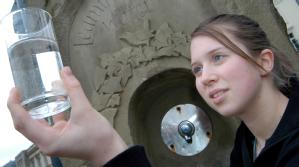Gifted students study the medicinal history of water
 On 14 February 2004 gifted students from across England studied the history of medicine and how perceptions of water have changed through the ages. The outreach event was organised by the National Academy of Gifted and Talented Youth, based at the University of Warwick, with the participation of the Centre for the History of Medicine, and was led by Hilary Marland and Jane Adams.
On 14 February 2004 gifted students from across England studied the history of medicine and how perceptions of water have changed through the ages. The outreach event was organised by the National Academy of Gifted and Talented Youth, based at the University of Warwick, with the participation of the Centre for the History of Medicine, and was led by Hilary Marland and Jane Adams.
Twenty students aged 12-16 visited The Royal Pump Rooms in Leamington Spa to explore the health giving properties of water and the rise of the spa.
From ancient times particular types of water have been seen to have almost magical health-giving properties and the ability to cure many different ailments. Ancient springs were tapped in the eighteenth century and the spa cure developed as a medical treatment and a major form of tourism. It was claimed spa treatment cured a huge number of disorders including rigidity of the joints, the effects of gout and rheumatism, and various paralytic conditions.
In the afternoon water’s role as a source of great danger was examined by focussing on public health issues and the nineteenth-century cholera epidemics.
"Up to the nineteenth century water was in short supply, dirty and unhealthy,” says Dr Hilary Marland, Director of the Centre for the History of Medicine. “Washing was considered highly risky and indulged in only very occasionally. Water supplies, especially in growing urban communities, were filthy.”
By focusing on the detective work of nineteenth-century doctors, particularly Dr John Snow, students examined how the link between water supply and the spread of cholera was established. The students also used their investigative skills to explore how the reforms of doctors, government and water engineering projects finally made water safe.
By the day’s end the students had encountered a history of changing attitudes towards water, and learned how something so commonplace can influence health, culture and society.
